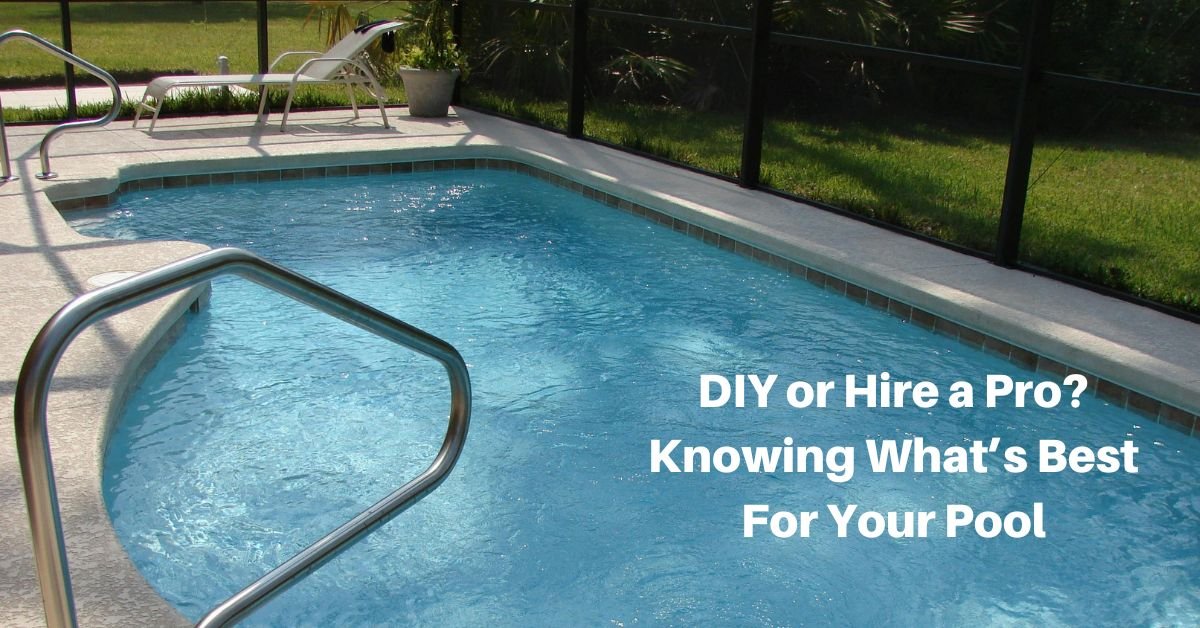Owning a pool comes with the inevitable need for maintenance and repairs. Whether it’s a minor leak, equipment failure, or surface damage, you’ll have to decide between embarking on a DIY repair journey or calling in the professionals. This choice impacts the cost and time involved as well as the quality and longevity of the repair. Understanding the nuances of each option can help you make an informed decision that aligns with your capabilities, budget, and expectations.
Understanding Pool Repairs
Pool repairs can range from simple tasks like replacing a worn gasket to more complex issues like fixing a leak in the pool’s structure. The type of pool, its age, and how well it’s been maintained can all influence the complexity of repairs. Before deciding on a DIY approach or hiring a professional, it’s crucial to assess the repair’s scope accurately. Be honest about what you can do versus what’s probably beyond your capabilities.
Pros of DIY Pool Repairs
Cost Savings: One of the most compelling reasons to consider DIY pool repairs is the potential for cost savings. Professional labor can be expensive, and doing the work yourself eliminates these costs. If you’re on a tight budget, DIY repairs can make the difference between fixing a problem immediately and delaying repairs due to financial constraints.
Flexibility and Control: Tackling pool repairs on your own offers the flexibility to work on your timeline and make decisions about the repair process and materials used. This control can be particularly appealing if you have specific preferences or want to ensure that only certain products are used in their pool.
Learning and Satisfaction: For many, repairing their pool is an opportunity to learn new skills and gain a deeper understanding of its operation. There’s also a significant sense of satisfaction and accomplishment that comes from completing repairs on your own.
Cons of DIY Pool Repairs
Risk of Mistakes: Without the proper knowledge and experience, DIY repairs can go awry, potentially leading to further damage or the need for more extensive repairs later. The risk of making a mistake is a critical consideration, especially for complex or unfamiliar repairs.
Time Investment: DIY repairs require a significant investment of time, both to learn the necessary skills and to perform the work. This time commitment can be substantial and may lead to extended downtime for the pool, affecting its use during prime swimming seasons.
Limitations on Complex Repairs: Some pool repairs are simply beyond the scope of DIY due to the specialized knowledge, tools, or equipment required. Recognizing these limitations is essential to avoid getting yourself in over your head.
Pros of Professional Pool Repairs
Expertise and Experience: Professionals bring a wealth of experience and specialized knowledge to pool repairs. They can usually diagnose and fix problems more efficiently than the average homeowner, which can be invaluable, especially for complex issues that require a deep understanding of pool systems.
Warranty and Liability: Many professional pool repair services offer warranties that give homeowners peace of mind and protection against future issues. Additionally, professionals typically carry liability insurance to cover any accidental damage during the repair process.
Access to Professional-Grade Materials and Tools: Pool repair professionals have access to high-quality materials and specialized tools that may not be readily available to DIY enthusiasts. This access can ensure that repairs are performed to a higher standard, potentially extending the life of the repair.
Cons of Professional Pool Repairs
Higher Costs: The most significant drawback of professional pool repairs is the cost. Labor charges can quickly add up, making professional repairs significantly more expensive than DIY solutions. For those on a tight budget, these costs can be a deciding factor in favor of DIY.
Scheduling Constraints: Working with professionals means fitting into their schedule, which can sometimes lead to delays in completing the repair. During peak season, these delays can be particularly frustrating when you’re eager to use your pool.
Risk of Poor Service: Not all pool repair services are created equal, and there’s always a risk of hiring a company that provides subpar service. Conducting thorough research and vetting potential service providers is crucial to avoid disappointment.
Making the Decision
Deciding between DIY and professional pool repairs involves weighing several factors:
- Nature of the Repair: Assess the complexity of the repair. Simple tasks may be well within the capabilities of a handy homeowner. At the same time, more complicated issues might best be left to professionals.
- Personal Skills and Knowledge: Consider your skills and knowledge. A DIY approach might be feasible if you have experience with similar repairs. If not, the learning curve might be too steep for critical repairs.
- Budget: Reflect on your budget. While DIY might save on labor costs, unexpected issues or mistakes can lead to higher expenses in the long run. Conversely, while initially more costly, professional repairs come with warranties and assurance of quality.
The decision between DIY and professional pool repairs can be complicated, influenced by the repair’s complexity, personal expertise, and financial considerations. For minor issues or tasks within your skill set, DIY repairs can offer savings and satisfaction. However, professional services are worth the investment for complex repairs or when quality and reliability are paramount. Ultimately, the right choice balances practicality, safety, and budget to keep your pool in top condition for years of enjoyment.









